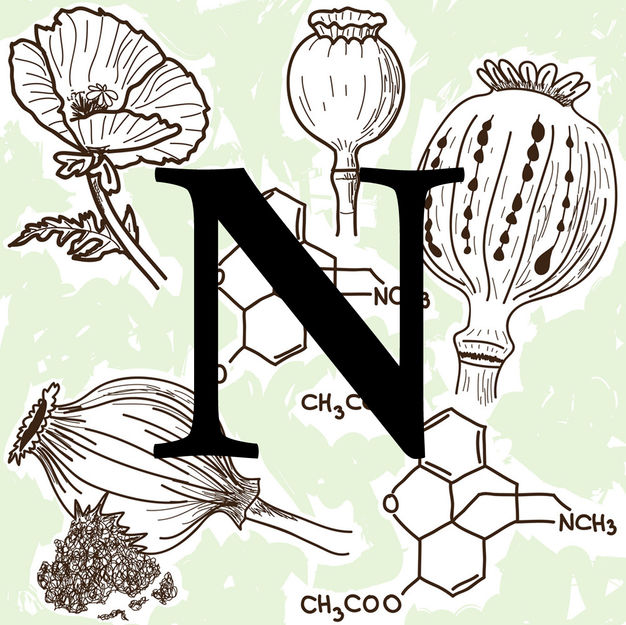
Narcotica Podcast
Christopher Moraff, Troy Farah, Zachary Seigel
This is Narcotica, a podcast about the war on drugs and the people caught in the middle, brought to you by dedicated science and drug policy journalists Christopher Moraff, Zachary Siegel, and Troy Farah.
- 45 minutes 1 secondEpisode 89: Can Good Drug Policy Survive 2025?
Last year was a crazy time for drug policy and 2025 is looking to up the ante on the chaos. Narcotica hosts Chris Moraff, Aaron Ferguson and Troy Farah reflect on what went wrong, what can be done and what to hope for, even in the midst of an escalating crisis.
They discuss the recent counts in overdose deaths, how fentanyl is changing (and even disappearing in some cases) while xylazine, medetomidine and other drugs are making their way into dope bags. Of course, everyone is concerned with how the incoming administration will handle things, including their bloodthirst for war with Mexico and a crackdown on harm reduction. But there are also plenty of reasons to hope — and keep fighting.
If you liked this episode, here are others you might enjoy:
Episode 50: Sicarios and Supply Side Economics with Stewart Scott
Episode 34: “Inside the Bloody War on Drugs” with Antony Lowenstein
Episode 75: Copaganda — The Favorite Tool of Drug Warriors with Alec KarakatsanisFollow Narcotica on Instagram, Facebook, Twitter, YouTube and support us on Patreon. We just opened a shop where you can order Narcotica merch: narcocast.myshopify.com Help keep this podcast ad-free! Your support is appreciated!
We’re on Spotify, iTunes, Stitcher and more. Tell your friends about us! Rate us! And thanks for your support!
Producers: Christopher Moraff, Troy Farah, Aaron Ferguson
Music: Glass Boy / Nomad1
Intro voice: Jenny SchayeThe post Episode 89: Can Good Drug Policy Survive 2025? appeared first on Narcotica.
10 January 2025, 4:58 am - 54 minutes 58 secondsEpisode 88: Helping Harm Reduction Flourish with Joy Rucker
Harm reduction means so many different things to so many different people, and some have even grown weary of the way the term has now been weaponized. How do we get back to the true core of helping people? Maybe by returning to the roots of the harm reduction movement to understand why these practices evolved in the first place.
On this episode, Narcotica co-hosts Aaron Ferguson and Troy Farah speak with Joy Rucker, co-founder of the Black Harm Reduction Network (BHRN), and also a National Harm Reduction Consultant and Founder of the Texas Harm Reduction Alliance. Joy has served people with HIV, substance use, mental health and unhoused issues for over 30 years. Her story is one of strength and adaptability, responding with compassion in the face of discrimination, stigma and attacks on public health.
If you liked this episode, here are others you might enjoy:
Episode 70: How Testosterone Bans Criminalize the Body with Adryan Corcione
Episode 58: How Racism Fuels The Drug War with Kassandra Frederique
Episode 76: How To Change Your Mind About ALL Drugs with Veronica WrightFollow Narcotica on Instagram, Facebook, Twitter, YouTube and support us on Patreon. We just opened a shop where you can order Narcotica merch: narcocast.myshopify.com Help keep this podcast ad-free! Your support is appreciated!
We’re on Spotify, iTunes, Stitcher and more. Tell your friends about us! Rate us! And thanks for your support!
Producers: Christopher Moraff, Troy Farah, Zachary Siegel, Aaron Ferguson
Music: Glass Boy / Nomad1
Intro voice: Jenny SchayeThe post Episode 88: Helping Harm Reduction Flourish with Joy Rucker appeared first on Narcotica.
26 September 2024, 5:39 am - 1 hour 6 minutesEpisode 87: Drug Testing Equals Empowerment with Dr. Nabarun Dasgupta and Charlton Roverson
On today’s episode, we’re going to talk about drug testing but not the tedious ways in which you should (probably) do it. There are plenty of great guides out there which we’ll link to one or two in the show notes. Instead, we’re going to discuss how drug testing equals empowerment. It’s more than just knowing what you may or may not be taking. It’s about stepping in where the government has failed and finding autonomy.
Narcotica co-hosts Aaron Ferguson and Troy Farah spoke with Charlton Roverson, the Eastern Regional Coordinator with the North Carolina Harm Reduction Coalition in Fayetteville and Dr. Nabarun Dasgupta, a pharmaco-epidemiologist and scientist at University of North Carolina at Chapel Hill who helps run the UNC Street Drug Analysis Lab. More info at https://www.streetsafe.supply/
Here are some drug testing guides:
Bunk Police: https://bunkpolice.com/
Reagent testing instructions from DanceSafe: https://dancesafe.org/testing-kit-instructions/
CDC guide to fentanyl test strips: https://www.cdc.gov/stop-overdose/safety/index.html
If you liked this episode, here are others you might enjoy:
Episode 55: Street Sampling Synthetics, from Carfentanil to Xylazine with Alex Krotulski
Episode 82: Drug War Activism and the Future of Harm Reduction with Louise Vincent
Episode 84: How Drug Seizures Damage Public Health with Drs. Bradley Ray, Jennifer J. Carroll and Brandon del PozoFollow Narcotica on Instagram, Facebook, Twitter, YouTube and support us on Patreon. We just opened a shop where you can order Narcotica merch: narcocast.myshopify.com Help keep this podcast ad-free! Your support is appreciated!
We’re on Spotify, iTunes, Stitcher and more. Tell your friends about us! Rate us! And thanks for your support!
Producers: Christopher Moraff, Troy Farah, Zachary Siegel, Aaron Ferguson
Music: Glass Boy / Nomad1
Image: Images via The Noun Project // edit: Troy Farah
Intro voice: Jenny SchayeThe post Episode 87: Drug Testing Equals Empowerment with Dr. Nabarun Dasgupta and Charlton Roverson appeared first on Narcotica.
1 August 2024, 3:32 am - 32 minutes 8 secondsBonus Episode: When Nothing Changes Nothing Changes from Naturally Noncompliant
Narcotica and Narcomedia are proud to share an exciting new sibling podcast, Naturally Noncompliant, which is about people who stand in line and fight for safe supply, especially methadone, the original safe supply. Methadone is the first frontier in this fight, and this show emphasizes the voices of patients and directly impacted people in that battle.
The material for this show stems from the “Naturally Noncompliant” call that takes place every other Thursday and is organized by the National Survivors Union, the national voice of people who use drugs.
During COVID-19 methadone clinics were allowed to relax the stringent rules that had been in place for many decades for the first time. Few of them did so, and our story and interview today center around the entrenched attitudes and ossification that has kept the very treatment systems tasked with helping from doing so. Imagine what everyone else is doing…
This is the first of a two part interview with Irene Garnett and Caty Simon.
Caty Simon has spent 20 years in the low-income rights, psychiatric survivors’ rights, sex workers’ rights, and drug users union movements. She is a leadership team member of and a sex worker liaison for National Survivors Union (NSU), the United States national drug users union.
Follow Naturally Noncompliant on iTunes, iHeart Radio, Spotify and more.
The post Bonus Episode: When Nothing Changes Nothing Changes from Naturally Noncompliant appeared first on Narcotica.
28 May 2024, 4:09 am - 1 hour 15 minutesEpisode 86: Why Naloxone Still Matters with Nancy D. Campbell
Naloxone is a miracle drug. Calling any drug a miracle can be problematic, but admittedly there are a few of them, in my opinion: penicillin, insulin, mifepristone and misoprostol, thorazine, viagra (cough, cough) and yes, naloxone. I think it qualifies as a miracle drug, something that works so well it is astonishing.
So many people fought so hard and for so long to have access to naloxone. It wasn’t always so available like it is in some places today. But the way that we are treating opioid overdose antagonists is changing. Many companies have price-gouged their way into profiting and exploiting a vulnerable population. They are bringing in naloxone analogs that they claim are more effective, without much evidence, but they do have serious side effects. And because the drug supply is only getting more and more unpredictable, with many non opioids entering the mix like xylazine and benzo analogs, naloxone may not help with overdoses of this kind. How can we navigate this shifting landscape?
Narcotica co-hosts Chris Moraff and Troy Farah speak with Nancy D. Campbell, author of the books Discovering Addiction and OD: Naloxone and the Politics of Overdose. She is a historian of science who studies addiction research and treatment at RPI, Rensselaer Polytechnic Institute in Troy, New York, including at the U.S Narcotic Farm in Lexington, Kentucky.
Learn more about Nancy D. Campbell here.
Read “OD: Naloxone and the Politics of Overdose” here: https://doi.org/10.7551/mitpress/12054.001.0001
If you liked this episode, here are others you might enjoy:
Episode 36: Moral Hazards and Naloxone, A Toxicologist’s Perspective with Ryan Marino
Episode 65: Restoring Trust in Doctors Amidst The Overdose Crisis with Dr. Ben Cocchiaro and Dr. Ashish Thakrar
Episode 73: Oh No! Not Naltrexone! with Nancy CurranFollow Narcotica on Instagram, Facebook, Twitter, YouTube and support us on Patreon. We just opened a shop where you can order Narcotica merch: narcocast.myshopify.com Help keep this podcast ad-free! Your support is appreciated!
We’re on Spotify, iTunes, Stitcher and more. Tell your friends about us! Rate us! And thanks for your support!
Producers: Christopher Moraff, Troy Farah, Zachary Siegel, Aaron Ferguson
Music: Glass Boy / Nomad1
Image: Image via VCU Capital News Service / Flickr // edit: Troy Farah
Intro voice: Jenny SchayeThe post Episode 86: Why Naloxone Still Matters with Nancy D. Campbell appeared first on Narcotica.
29 April 2024, 3:49 am - 1 hour 9 minutesEpisode 85: “Narcoterrorism” is just another forever war lie with Oswaldo Zavala
If you only get your international drug policy history from Netflix, you might think that the drug traffickers in Mexico are a smart, coordinated system of violent sociopaths that control the government. They are cartels. Therefore they have leadership, and hierarchies and tangible targets that can be taken out just like in a Call of Duty game.
This rhetoric has driven us to where we are today, with talks of labeling fentanyl a weapon of mass destruction — as ludicrous a label anyone could generate for such a thing — and serious conversation by right wing lunatics who are suggesting invading Mexico to assassinate every drug cartel member. Because that will work sooo well, like every other U.S. intervention over the last 50 to 100 years.
It’s a pivotal time in drug policy in North America. All the progress we’ve made seems ready to unravel, with perhaps the exception of cannabis legalization. Harm reduction and safe supply is heavily under attack in Canada, policies like drug decriminalization in Oregon were starved of funding, as if they were designed to fail and now we have all this talk about making things worse by intensifying the violence south of the border — not that it was ever exactly peaceful. How do we respond to such terrifying policy proposals?
On this episode of Narcotica, co-host Troy Farah interviews journalist Oswaldo Zavala, a professor of Latin American Literature and Culture at the City University of New York and author of the book Los cárteles no existen — Drug Cartels Do Not Exist: Drug Trafficking and Culture in Mexico.
Follow Oswaldo on Twitter @Oswaldo__Zavala and visit his university profile here: https://www.csi.cuny.edu/campus-directory/oswaldo-zavala
If you liked this episode, here are others you might enjoy:
Episode 50: Sicarios and Supply Side Economics with Stewart Scott
Episode 34: “Inside the Bloody War on Drugs” with Antony Lowenstein
Episode 56: Drug Use During Disaster with Aaron FergusonFollow Narcotica on Instagram, Facebook, Twitter, YouTube and support us on Patreon. We just opened a shop where you can order Narcotica merch: narcocast.myshopify.com Help keep this podcast ad-free! Your support is appreciated!
We’re aware we haven’t put out many episodes in 2023, but Narcotica is not dead and we have no intention of retiring this important program. Like NPR and other podcasts, we are an independent, listener-supported program. We couldn’t do this without you. That sounds like hyperbole, that sounds like something every podcast says, but it’s 100 percent true and we are deeply grateful for all of you. Thank you.
We’re on Spotify, iTunes, Stitcher and more. Tell your friends about us! Rate us! And thanks for your support!
Producers: Christopher Moraff, Troy Farah, Zachary Siegel, Aaron Ferguson
Music: Glass Boy / Nomad1
Image: Image via DEA // edit: Troy Farah
Intro voice: Jenny SchayeThe post Episode 85: “Narcoterrorism” is just another forever war lie with Oswaldo Zavala appeared first on Narcotica.
9 February 2024, 1:12 am - 1 hour 9 minutesEpisode 84: How Drug Seizures Damage Public Health with Drs. Bradley Ray, Jennifer J. Carroll and Brandon del Pozo
Like some kind of perverse fishing expedition, we’re all familiar with the drug warriors’ favorite form of theater: the drug bust. Every police department seems to do this, posing their officers with huge (or even tiny, inconsequential) bags of drugs, stacks of cash and sometimes a cache of weapons, propping everything up as if it’s the prize that will finally win this futile, violent campaign.
It’s been clear for decades that drug busts don’t stop the flow of drugs (or even make a dent), but amongst certain people, it is also common knowledge that these busts actually worsen drug overdoses. In other words, taking drugs off the street can increase ER visits, cause more fatalities and just generally make underground drug markets less safe.
Now, thanks to research last year in the American Journal of Public Health, we have some pretty damning evidence of this relationship. Narcotica co-hosts Chris Moraff and Troy Farah spoke with the study authors, Drs. Bradley Ray, Jennifer J. Carroll and Brandon del Pozo about their research, its policy implications, but also how this study fits into the broader picture of safe supply, how most cops resent being part of the drug war and
You can read the paper titled “Spatiotemporal Analysis Exploring the Effect of Law Enforcement Drug Market Disruptions on Overdose, Indianapolis, Indiana, 2020–2021 ” here: https://doi.org/10.2105/AJPH.2023.307291 Salon was one of many publications that covered this study if you’d like to read more.
(This episode was done over the summer, hence mention of DULF still being a thing… It’s taken us way too long to get new episodes out lately, but 2024 should be different.)
If you liked this episode, here are others you might enjoy:
Episode 75: Copaganda — The Favorite Tool of Drug Warriors with Alec Karakatsanis
Episode 44: Reimagining Public Health and Racial Justice with Dr. Ricky Bluthenthal
Episode 12: Beyond Borders — “El Chapo” and the Mexican Fentanyl Pipeline with Keegan HamiltonFollow Narcotica on Instagram, Facebook, Twitter, YouTube and support us on Patreon. We just opened a shop where you can order Narcotica merch: narcocast.myshopify.com Help keep this podcast ad-free! Your support is appreciated! We’re on Spotify, iTunes, Stitcher and more. Tell your friends about us! Rate us! And thanks for your support!
Producers: Christopher Moraff, Troy Farah, Zachary Siegel, Aaron Ferguson
Music: Glass Boy / Nomad1
Image: Image via Coast Guard News // edit: Troy Farah
Intro voice: Jenny SchayeThe post Episode 84: How Drug Seizures Damage Public Health with Drs. Bradley Ray, Jennifer J. Carroll and Brandon del Pozo appeared first on Narcotica.
12 January 2024, 3:57 am - 1 hour 19 minutesEpisode 83: The Parents Who Oppose The War on Drugs with Tamara Olt and Gretchen Bergman
The War on (People who Use) Drugs has claimed over a million victims in the last two decades, every fatal overdose representing deep policy failures that attempt in vain to control normal human behavior: self-medicating and inducing euphoria.
None of this wonky policy bullshit matters much when you’re the parent of a child who dies from an overdose.
Few things in life are as devastating as losing your kid. It stirs up some of the deepest, darkest emotions humans are capable of and when drugs are involved, that typically turns into a thirst for retribution. That can mean demanding stricter penalties for drug use, like so-called drug homicide laws, or calls for increased police surveillance. But we have over a century of data proving that prohibition doesn’t work. More cops, more draconian drug laws — it all just backfires. We have more police, more prisons and yet more drug overdose deaths than ever before. That’s why it’s such a breath of fresh air when parents whose children struggle with drug use or addiction advocate for harm reduction and sensible drug policy.
Narcotica co-host Troy Farah spoke with Gretchen Burns Bergman, whose two grown sons who are in long-term recovery from heroin addiction, and Tamara Olt, M.D., who lost her 16-year-old son Joshua to an accidental heroin overdose in 2012. Both strongly advocate for a more rational approach to how we treat substance use in the U.S. They discuss everything from safe supply, to the myths of “tough love” and “enabling” to buprenorphine access to the ridiculous (but trending) idea that fentanyl is a weapon of mass destruction.
This interview, which was conducted last November, was also featured in Salon.
Read Tamara’s essay in Elle here: https://www.elle.com/culture/career-politics/a29036663/syringe-exchange-grief-recovery/
Lear more about GRASP (Grief Recovery After Substance Passing) here: https://grasphelp.org/
Learn more about A New PATH (Parents for Addiction Treatment and Healing), a non-profit organization that works to reduce the stigma associated with substance use disorders through education and compassionate support at https://www.anewpath.org/
Learn more about Moms United at: https://www.momsunited.net/
Also, Narcomedia is excited to announce a new project, all from the perspective of people who use drugs: Naturally Noncompliant is a new podcast all about people who use methadone. Listen to the first episode here or on iTunes or Spotify: https://rephonic.com/podcasts/naturally-noncompliant
If you liked this episode, here are others you might enjoy:
Episode 62: Policing Pleasure — The Intersection of Sex Work and Drug Use with Tamika Spellman and Caty Simon
Episode 56: Drug Use During Disaster with Aaron Ferguson
Episode 67: Methadone in the Time of Covid with Danielle RussellFollow Narcotica on Instagram, Facebook, Twitter, YouTube and support us on Patreon. We just opened a shop where you can order Narcotica merch: narcocast.myshopify.com Help keep this podcast ad-free! Your support is appreciated! We’re on Spotify, iTunes, Stitcher and more. Tell your friends about us! Rate us! And thanks for your support!
Producers: Christopher Moraff, Troy Farah, Zachary Siegel, Aaron Ferguson
Music: Glass Boy / Nomad1
Image: Image via The Noun Project // edit: Troy Farah
Intro voice: Jenny SchayeThe post Episode 83: The Parents Who Oppose The War on Drugs with Tamara Olt and Gretchen Bergman appeared first on Narcotica.
15 June 2023, 3:25 am - 1 hour 12 minutesEpisode 82: Drug War Activism and the Future of Harm Reduction with Louise Vincent
The Drug War is more brutal than ever. Overdose deaths are still shattering records, there’s talk of war with the cartels, increased penalties are just making things worse, there’s little money for harm reduction programs or addiction treatment, yet plenty of cash for prisons, cops and the DEA, weird new drugs are appearing that no one knows how to handle and on and on. Meanwhile, the harm reduction movement is going through some massive changes, some good, some bad. But what we know for sure is that it’s critical for people to come together, stand up and demand a stop to the destructive force that is prohibition.
On this episode, the crew interviews Louise Vincent, director of the NC Survivors Union in North Carolina and on the leadership team of the National Drug User Union, an organization of former and active drug users who have come together to provide services for a community that is under-represented and underserved. Narcotica’s Chris Moraff, Zach Siegel and Troy Farah talk with Louise about xylazine, drug testing, using portable oxygen tanks to reverse cocaine overdoses (yes, really!), methadone access, the importance of drug user unions, why drug sellers are a community service, what it was like being on Last Week Tonight and so much more.
We’ve been trying to get Louise on for over a year and are really excited to share this episode with everyone. Thanks for listening. Expect more new episodes from us soon.
Learn more about NC Survivors Union at http://ncurbansurvivorunion.org/
Learn more about Louise’s story here: https://drugpolicy.org/drugsellers/louise
If you liked this episode, here are others you might enjoy:
Episode 62: Policing Pleasure — The Intersection of Sex Work and Drug Use with Tamika Spellman and Caty Simon
Episode 56: Drug Use During Disaster with Aaron Ferguson
Episode 67: Methadone in the Time of Covid with Danielle RussellFollow Narcotica on Instagram, Facebook, Twitter, YouTube and support us on Patreon. We just opened a shop where you can order Narcotica merch: narcocast.myshopify.com Help keep this podcast ad-free! Your support is appreciated! We’re on Spotify, iTunes, Stitcher and more. Tell your friends about us! Rate us! And thanks for your support!
Producers: Christopher Moraff, Troy Farah, Zachary Siegel, Aaron Ferguson
Music: Glass Boy / Nomad1
Image: Vocal NY via Flickr // edit: Troy Farah
Intro voice: Jenny SchayeThe post Episode 82: Drug War Activism and the Future of Harm Reduction with Louise Vincent appeared first on Narcotica.
20 April 2023, 11:10 pm - 1 hour 15 minutesEpisode 81: Harm Reduction Against the Prison-Industrial Complex
Harm reduction is an imperfect philosophy that serves as the only wedge between prohibition and what we all really want, which is a healthy, productive society. If more police and prisons could make drugs safer, we’d have a lot less overdose deaths and problematic addiction. But that’s not what’s happening. Drugs are more available than ever, while overdose deaths continue to shatter records. If this is a war, we lost long ago. (Of course, as we repeatedly emphasize on this show, not all drug use is addiction and in fact, most of it isn’t.)
Instead we have the prison-industrial complex. We have cops and judges that take on the role of doctors. We have a system that is designed to oppress, marginalize and criminalize rational human behavior. Yet, harm reduction in prisons — arguably the one place where it is needed most — is almost completely absent.
On today’s episode, Narcotica co-host Troy Farah spoke to someone who is sadly, currently behind bars. Because of that, we are using their adopted pseudonym, C. Dreams. C. is a writer and advocate interested in prison and criminal justice reform, LGBTQ rights, harm reduction and government and cultural criticism. She has studied history and theology with the Third Order of Carmelites and completed degrees in Systematic Theology and is currently studying law. C. has some brilliant writing being published in Filter Magazine. They talk all about drug use in prisons, from K2 to fentanyl, a positive methamphetamine story, the problems with lack of syringe access, let alone access to buprenorphine or methadone, and much much more.
Follow C. on Twitter at: @UnCagedCritique
Read C’s writing in Filter Magazine here: https://filtermag.org/author/c-dreams/
If you liked this episode, here are others you might enjoy:
Episode 26: Housing As Harm Reduction
Episode 75: Copaganda — The Favorite Tool of Drug Warriors with Alec Karakatsanis
Episode 45: Overdose Is Tragic, Not Murder with Morgan GodvinFollow Narcotica on Instagram, Facebook, Twitter, YouTube and support us on Patreon. We just opened a shop where you can order Narcotica merch: narcocast.myshopify.com Help keep this podcast ad-free! Your support is appreciated! We’re on Spotify, iTunes, Stitcher and more. Tell your friends about us! Rate us! And thanks for your support!
Producers: Christopher Moraff, Troy Farah, Zachary Siegel, Aaron Ferguson
Music: Glass Boy / Nomad1
Image: Shannon O’Toole via Flickr // edit: Troy Farah
Intro voice: Jenny SchayeThe post Episode 81: Harm Reduction Against the Prison-Industrial Complex appeared first on Narcotica.
2 February 2023, 7:02 pm - 1 hour 16 minutesEpisode 80: A Messy History of Methadone with Dr. Zoe Adams
At Narcotica, we’ve often talked about how methadone is one of the most over-regulated substances on the planet. It’s not a perfect drug — nothing is — but it helps a lot of people. So why is it so hard to access?
On this episode, the crew (Zachary Siegel, Chris Moraff and Troy Farah) speak with Dr. Zoe Adams, an internal medicine resident at Massachusetts General Hospital, whose thesis was a narrative history of methadone. It’s a long, strange chronicle, from its development in Germany, to becoming a mainstay in Nixon’s War on Drugs, but what’s most surprising is how little has changed. Learn about why this drug is so scrutinized, stigmatized and what people are doing to make it more available.
Follow Zoe on Twitter at: @zoe_m_adams
Read Zoe’s thesis here: https://elischolar.library.yale.edu/ymtdl/4049/
If you liked this episode, here are others you might enjoy:
Episode 73: Oh No! Not Naltrexone! with Nancy Curran
Episode 67: Methadone in the Time of Covid with Danielle Russell
Episode 48: Moms And Methadone with Elizabeth BricoFollow Narcotica on Instagram, Facebook, Twitter, YouTube and support us on Patreon. We just opened a shop where you can order Narcotica merch: narcocast.myshopify.com Help keep this podcast ad-free! Your support is appreciated! We’re on Spotify, iTunes, Stitcher and more. Tell your friends about us! Rate us! And thanks for your support!
Producers: Christopher Moraff, Troy Farah, Zachary Siegel, Aaron Ferguson
Music: Glass Boy / Nomad1
Intro voice: Jenny Schaye
The post Episode 80: A Messy History of Methadone with Dr. Zoe Adams appeared first on Narcotica.
31 December 2022, 9:22 pm - More Episodes? Get the App
- https://narcocast.com
- en-US
Your feedback is valuable to us. Should you encounter any bugs, glitches, lack of functionality or other problems, please email us on [email protected] or join Moon.FM Telegram Group where you can talk directly to the dev team who are happy to answer any queries.
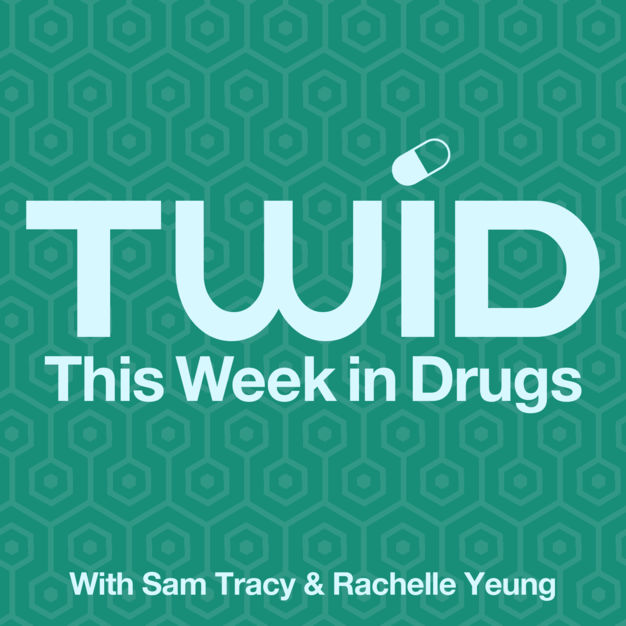 This Week in Drugs
This Week in Drugs
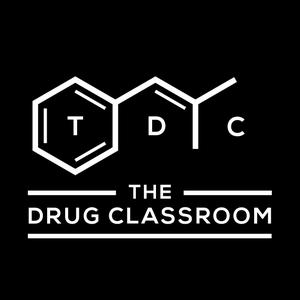 The Drug Classroom
The Drug Classroom
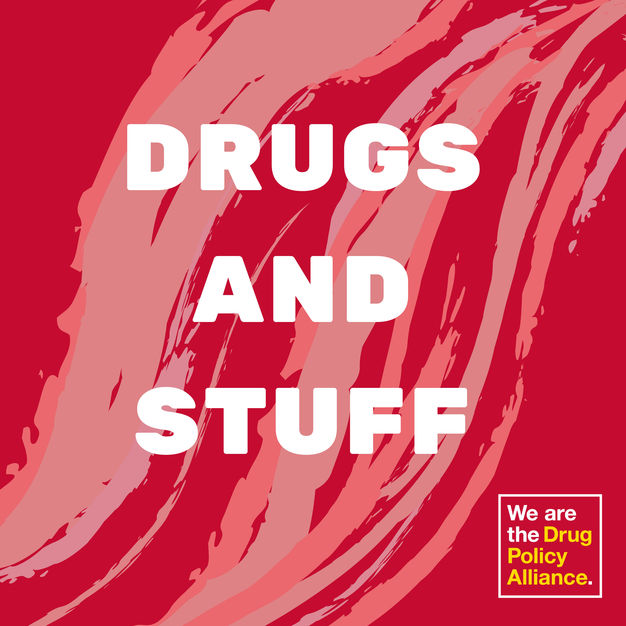 Drugs and Stuff: A Podcast about Drugs, Harm Reduction, Mass Incarceration, The Drug War and other Stuff, from the Drug Polic
Drugs and Stuff: A Podcast about Drugs, Harm Reduction, Mass Incarceration, The Drug War and other Stuff, from the Drug Polic
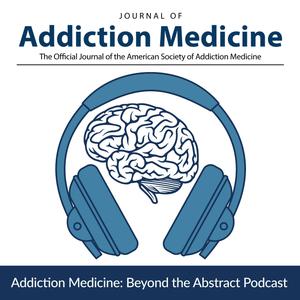 Addiction Medicine: Beyond the Abstract
Addiction Medicine: Beyond the Abstract
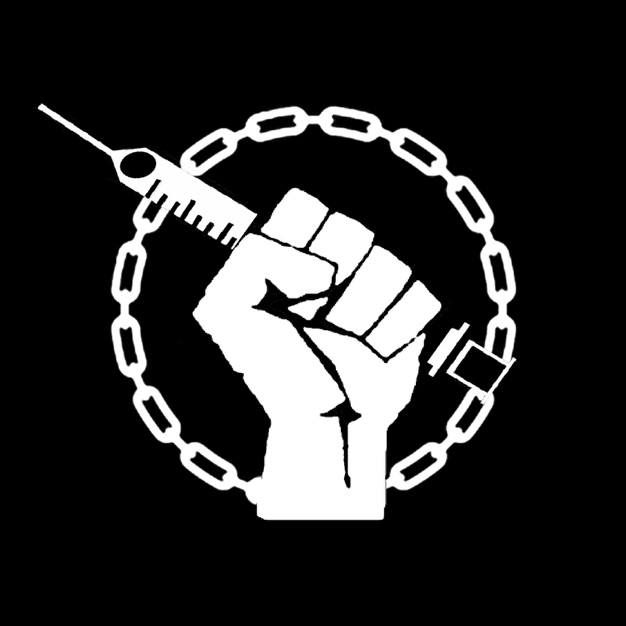 Crackdown
Crackdown